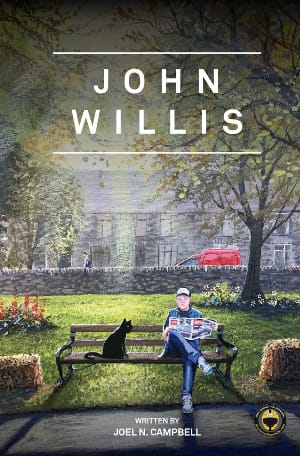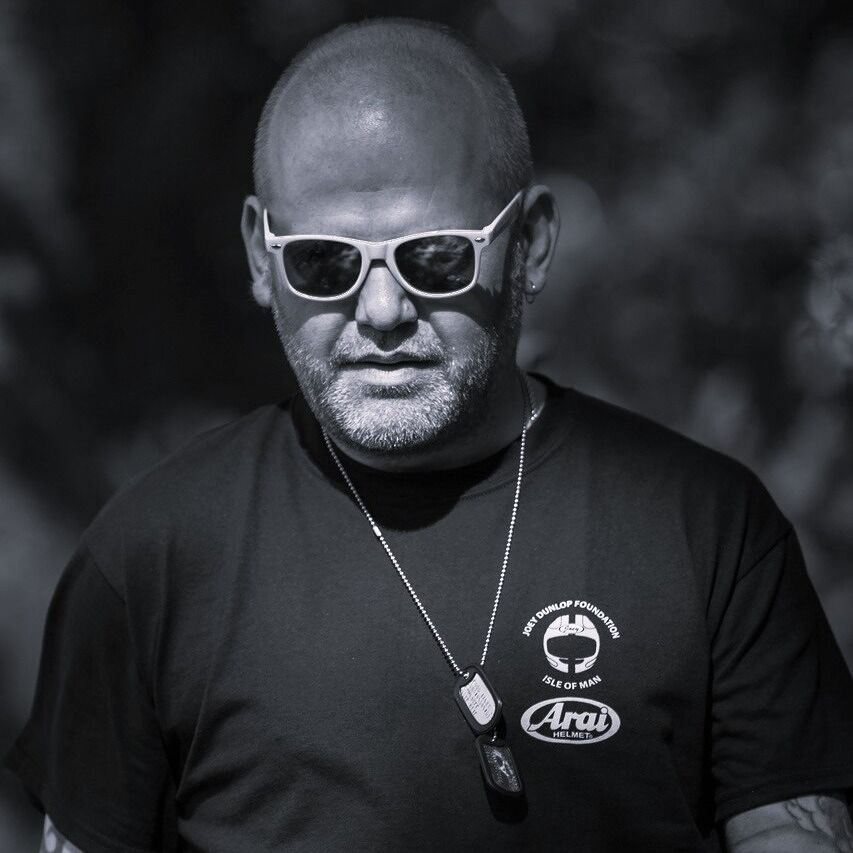"A pint in a pub, chips wrapped in newspaper, bike racing, music, dancing, living in lodgings, a man and his suitcase..."
Road-racing fan, rider and author, Joel Campbell has switched from true-life to fantasy in his latest book which was released last month.

Road-racing fan, rider and author, Joel Campbell has switched from true-life to fantasy in his latest book which was released last month.
Joel’s first book, ‘Forget Me Not’, chronicled the life and career of Stockton-based Daley Mathison, the motorcycle racer who sadly lost his life following an incident racing at the Isle of Man TT in 2019. A limited edition print run of 523 copies of the book sold out in just five months.
His new book, ‘John Willis’, is a novel which, although changing tack to a supernatural crime thriller, still has motorcycling centre stage as his heroes (which include a talking cat) tackle paranormal beings who feed on the thrill and exhilaration of road racing events around the UK and Europe.
We catch up with Joel, who is now based in Scarborough, amidst a season of road racing at various venues including Oliver’s Mount.
Q: I must admit (says Gillie), Daley’s book was one of the hardest I’ve ever worked on… there is an ominous feel to it as you go through each road racing season, just knowing what is coming up. Why did you decide to write it? And how did you get through the tough times when you were working on it?
A: It was about six months after Daley’s accident, Christmas 2019. I had been reading a couple of motorcycle racing biographies and thought that Daley’s life and career deserved to be immortalised in print, not forgotten. I also had this nagging desire to provide his daughter, Daisy Blu, with some small token that she could read, maybe show her own children one day.
I didn’t struggle with the fact that this book would have no happily ever after. I was prepared for that. I just wanted to do Daley proud. The struggles were related to the format, so it didn’t just feel like a reference book, a list of results and achievements. Luckily, I spotted a book owned by my friend Teigan, more of her later. It was the cover that caught my eye, but there was something in the storytelling mechanism that saved the day. It used social media excerpts to bring one of the characters back to life. The book? ‘A Good Girl’s Guide to Murder’ by Holly Jackson.
Q: Daley’s book sold out within months. What kind of feedback have you had, from Daley’s family and from his fellow riders and fans?
A: I can’t think of any negative feedback. I had great support from the road racing community. ‘Motorcycle News’ covered the book in print and digital form, and ‘Road Racing News’ published a great review. Everyone pulled together and helped to raise a not insubstantial amount for the Joey Dunlop Foundation and Daisy Blu. I received a lot of messages from people who really enjoyed the book and how it was laid out, its look. The road racing family is relatively small, compared to other sports. You get to know a lot of racers, organisers, volunteers and fans on a personal level. We tend to be very supportive of each other, but I honestly believe that ‘Forget me Not!’ was well received.
Q: How have you found the switch to writing fiction? And did it help that you kept that road racing theme?
A: I found it came quite easily, the transition. ‘Forget me Not!’ was my first book, so I wasn’t typecast. The road racing backdrop was more a case of write what you know, but it wasn’t really essential. It did help me in terms of time as I had knowledge of the sport and real-life experience of many of the places featured within the story. The biography was more research and editing than expressive writing, whereas fiction gives me freedom, allows my imagination to run riot. Someone gave me a Dick Francis book the other day. I realised that he used a similar formula, wrote what he knew, but the reader didn’t require a deep understanding of the horse racing world, in order to enjoy his work. If I could carve myself a similar niche, I’d be happy. For now, it’s best not to overthink it, become overly formulaic, just enjoy writing.
Q: If anyone doesn’t know yet, John Willis is based on a real cat who lives in Scarborough. What was it about that cat that inspired you to create the character we see in the book?
A: Well, it was Teigan again who provided the inspiration. Gillie, I consider as my mentor, and Teigan is most definitely my muse. She introduced me to her new cat. ‘What’s he called?’ I asked. When I heard his name, ‘John Willis’, I thought it was so unusual, cool. John is aloof, reserved, but with a hint of playfulness. I went home and started writing and the character of Mr Willis developed with ease.
Q: There has to be a second John Willis book – is that what you’re working on now and when can we expect to see it?
A: I started writing the second book before ‘John Willis’ was finished. I had lots of other ideas and notes that featured the John Willis character, but didn’t fit into the first book’s story arc. I’ve written half of ‘John Willis – Quandary’ and will complete it after the race season concludes in September. The third instalment is all laid out and ready to roll. I plan to release the second of the series in June 2026 and part three the following year.
Q: Do you have any writing rituals that keep you going? What are they and have they changed over time?
A: I’ve not been writing seriously for long, starting with the Daley book. I tried to watch and read various tutorials, but I’ve developed my own methods. I’m certain they aren’t unique to me. I keep ‘post-it’ notes upstairs and downstairs. Carry a notebook and pen when I’m out and about. If I have an idea, be it a name or something more substantial, I jot it down. Whether it gets used or not is immaterial, whatever the time of day, write it down or forget it. I type these scraps of random thoughts and ideas into a general writing document, polishing them a little. If they fit with something I’m writing I can just paste them into the relevant document. If not, they stay in the general document until they get the call. I gain a lot of ideas from people watching. I developed one character after smelling cigar smoke emanating from a car parked outside my local shop. I mixed that olfaction…interaction with a funny name that came into my head one morning. A character and chapter were the result of those two apparently inconsequential and unrelated puzzle pieces.
Q: If you could time-travel back to any period in time, when and where in the world would you go?
A: I’m pretty greedy, I’d not be satisfied with one point in time, backwards or forwards. I’ve always been interested in history and the idea of time travel. I lived abroad for half of my childhood, so the options are endless. I think it would depend whether I was an unnoticed observer or had to blend in and interact, as vulnerable as those I walked amongst. As an observer, it would be ancient cultures and events. As a participant, probably the swinging sixties in the UK. No particular location, just travelling about on the train. A pint in a pub, chips wrapped in newspaper, bike racing, music, dancing, living in lodgings, a man and his suitcase.
Q: Is there a novel you’d love to write if you had infinite time available?
A: Well, none of us have that, we are on a timer and no one knows when the clock will stop. I have no time pressure though, I fund my own writing so whether I finish a book, or not, depends on me. If I didn’t think my book was ready to publish, I wouldn’t push it through. I think if you find yourself saying ‘that’ll do’, then it’s time to have a word with yourself and do it properly, that counts for most tasks. If you are happy with ‘that’ll do’, your heart most likely isn’t into whatever you are doing.
Q: What short story ideas are you working on for future Harveys, and which basket excites you the most?
A: Dark & Urban Fantasy most likely. I have made one submission, but I’m not sure I really get short stories. Mine turned into a chapter for John Willis book two. I’m so filled to the gunnels with words and ideas at the moment, that it’s hard for me to artificially cap or abridge my writing. I think I’ll try again though as I found it quite useful for character development.
Q: What advice would you give anyone starting out on their writing and publishing adventure?
A: Write first and foremost for you. Don’t worry about whether people will like what or how you write. Even the most successful authors don’t appeal to everyone, the same applies to any subjective art. If you enjoy what you’re writing, you’ll be a happier person and it’ll be reflected in your work. Try and produce, within your own personal means, the best, most professional looking product you can. That’s why I approached Gillie and I’m so thankful I did. I want my books to be and look the best that they can be. If someone isn’t into my writing, I can’t control that, but I can ensure that the finished article is well presented and polished.






